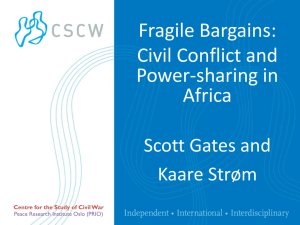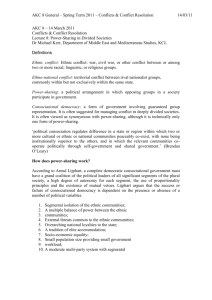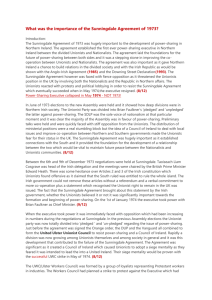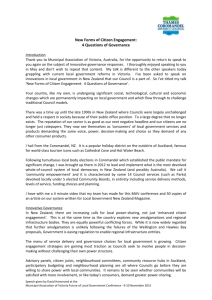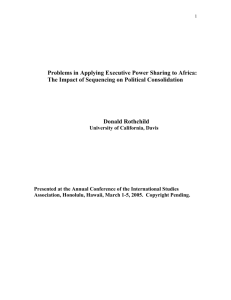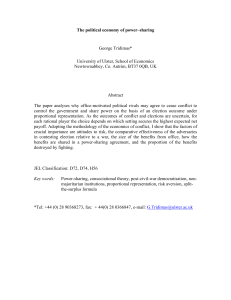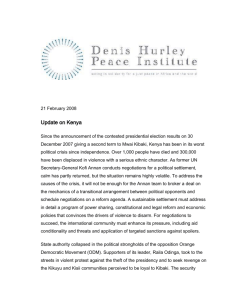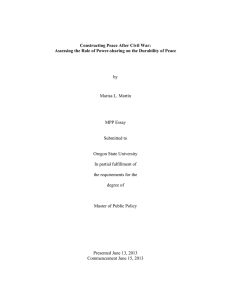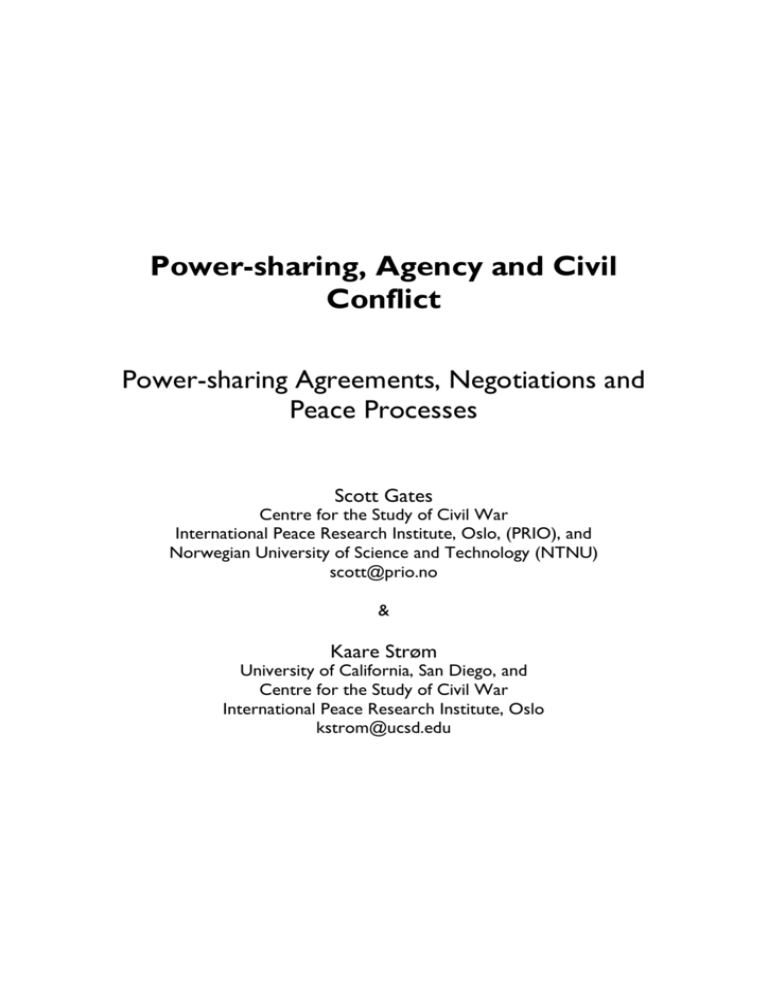
Power-sharing, Agency and Civil
Conflict
Power-sharing Agreements, Negotiations and
Peace Processes
Scott Gates
Centre for the Study of Civil War
International Peace Research Institute, Oslo, (PRIO), and
Norwegian University of Science and Technology (NTNU)
scott@prio.no
&
Kaare Strøm
University of California, San Diego, and
Centre for the Study of Civil War
International Peace Research Institute, Oslo
kstrom@ucsd.edu
Power-sharing Arrangements, Negotiations and Peace Processes
This policy brief forms part of a project entitled ‘Power-sharing Agreements, Negotiations
and Peace Processes’, which has produced a series of policy briefs and reports on Nigeria,
Liberia, Sierra Leone, Burundi, Kenya and Nepal.
This report and other reports and policy briefs may be downloaded from
http://www.prio.no/CSCW/Research-and-Publications/Project/?oid=65122
© Center for the Study of Civil War, Oslo (CSCW), 2007
All rights reserved. No parts of this publication may be reproduced, stored in a retrieval
system or utilized in any form or by any means, electronic, mechanical, photocopying,
recording, or otherwise without permission in writing from the copyright holder
ISBN 978-82-7288-288-3
Page ii
Scott Gates, CSCW
Kaare Strøm, UCSD
Power-sharing, Agency and Civil Conflict
Executive Summary
Power-sharing arrangements aim to reduce the risk of civil conflict by guaranteeing
potentially warring parties a role in a country’s government, thus lessening the stakes of
political contestation. In this way, power-sharing reduces the risk that spoilers will resort to
violence if they do not succeed in the process of democratic electoral contestation. While
power-sharing can reduce the incentive of electoral losers to renege on their commitment
to democracy, we argue that this depends on the nature of the relevant groups, as well as
on the political institutions that are chosen. The degree to which power-sharing agreements
are able to promote civil peace thus depends in part on the relative military capacity of the
fighting parties, as well as on the potential role of ‘spoilers’. The ideal environment for
power-sharing to shape peace is when the sides are evenly balanced and the costs of war
are relatively high. In contrast, when groups are less evenly matched and the costs of war
low, power-sharing implies non-proportional distributions of power and positive incentives
for spoilers. Under such conditions, power-sharing may increase rather than reduce the risk
of civil conflict.
Scott Gates, CSCW
Kaare Strøm, UCSD
Page iii
Power-sharing Arrangements, Negotiations and Peace Processes
Table of Contents
Table of Contents ........................................................................................................ iv 1. Map of Sierra Leone .............................................................................................. v 2. Introduction ........................................................................................................... 1 3. The Threat of Civil Conflict ................................................................................. 1 4. Spoilers and the Calculus of Conflict .................................................................. 2 5. The Remedy of Power-Sharing ............................................................................ 3 5.1 Is Power-Sharing Democratic? ............................................................................................... 5 5.2 Is Power-Sharing Effective? ..................................................................................................... 6 6. The Limitations of Power-Sharing ...................................................................... 7 6.1 Transaction Costs ..................................................................................................................... 8 6.2 Agency Costs: Adverse Selection and Moral Hazard ....................................................... 8 7. Modeling Civil Conflict.......................................................................................... 9 7.1 Self-enforcing Democracy ....................................................................................................... 9 7.2 The logic of power-sharing ................................................................................................... 10 7.3 Fighting as an outside option ................................................................................................ 10 7.4 Power-sharing in equilibrium ................................................................................................ 10 8. Implications .......................................................................................................... 11 9. References ............................................................................................................ 13 Page iv
Scott Gates, CSCW
Kaare Strøm, UCSD
Power-sharing, Agency and Civil Conflict
Power-sharing map
The map shows countries with post-conflict power sharing agreements
Source: Jarstad (2008): 112
Map made by Siri Aas Rustad
Scott Gates, CSCW
Kaare Strøm, UCSD
Page v
Power-sharing, Agency and Civil Conflict
1. Introduction
Civil conflict is a curse of much of the developing world. In order to prevent the
occurrence or recurrence of armed conflict in societies at risk, it is commonly
recommended that all parties to previous conflict and any potential spoilers be included in
power-sharing arrangements such as grand coalitions, federal institutions, and proportional
allocations of government positions and benefits. In other words, give all relevant parties a
share of the political pie. These features, it is commonly believed, may reduce the risk of
conflict by lessening the stakes of democratic political contestation. Yet, power-sharing
arrangements often consist of a bundle of different institutional mechanisms, each of which
may have more or less desirable effects, and some of which may even work at crosspurposes. Such institutions may, however, at the same time have unintended and
sometimes undesirable effects on the provision of public goods as well as on civil conflict.
Some potentially detrimental effects of power-sharing institutions stem from their rigidity
and from perverse incentives they may generate for politicians. These issues are the topics
of this paper.
Existing scholarship on power-sharing institutions include cross-national quantitative
studies as well as historical case studies of societies wracked by civil conflict. There has,
however, been little rigorous theoretical recognition of the fundamental problems in
collective decision making and in the agency relationships between politicians and their
constituents. Moreover, the prevalent theoretical conceptions and empirical measures of
the political institutions of power-sharing have been too simple. Finally, the empirical
literature has suffered from selection bias, as studies have focused much more on societies
that have actually experienced civil conflict than on societies that have faced similar
challenges but avoided overt conflict. For all these reasons, power-institutions are worth a
closer and more rigorous examination.
This paper begins to address this agenda. We begin by identifying and distinguishing
the most important features of power-sharing institutions, such as inclusiveness (embodied
in such governance practices as grand coalitions), proportionality, and devolution of power
(federalism). We then raise the questions of whether power-sharing is likely to be
democratic and effective in promoting civil peace and societal development. In essence, we
shall argue, power-sharing implies the pursuit of one conception of democracy, which we
shall refer to as ex post fairness, at the expense of others, such as ex ante uncertainty or
performance sensitivity. Finally, we develop a game-theoretic model of power-sharing and
show that its ability to promote civil peace depends in part on the resource distribution
between the potential “spoilers.” Our results show that in societies that are divided into
antagonistic groups of roughly equal resources, and where the costs of conflict are high,
power-sharing will be more likely than more majoritarian institutions to promote civil
peace. Where groups are less evenly matched, however, power-sharing may have less
obvious and beneficial consequences. Through these models, we will seek better to
understand the consequences of power-sharing versus other governance institutions in
societies prone to civil conflict.
2. The Threat of Civil Conflict
Civil conflict is by far the dominant form of armed conflict in the contemporary world
(Gleditsch et al., 2002), and its costs are enormous (Collier et al., 2003). In recent years,
civil war has left approximately 800,000 dead in Rwanda alone, 350,000 in Angola, and
Scott Gates, CSCW
Kaare Strøm, UCSD
Page 1
Power-sharing Arrangements, Negotiations and Peace Processes
150,000 in Liberia.1 Building peace by preventing civil conflict is therefore a paramount
objective for national and international policy makers, and this concern has been central to
many of the most prominent recent political events in the Middle East, Central Asia and
Africa (including Iraq, Lebanon, Afghanistan, and Sudan).
Peace-building involves manifold challenges. The most pressing of these is typically to
prevent a return to overt violence. Peace agreements themselves are not enough, as each
of the above cases testifies. In each of these cases (Rwanda, Angola, and Liberia), peace
agreements were signed, in some cases several such documents. Yet, these agreements
failed, and a horrendous human toll continued to fall on these societies. Peace-building
therefore requires ongoing efforts to contain and prevent violence as well as the
establishment of viable civilian institutions for the long haul. These challenges can be
particularly profound in societies that have already experienced conflict or that are
susceptible to such conflicts, and the search for remedies is therefore particularly critical
under such circumstances.
Thus, peace-building requires not only committed efforts to end an ongoing conflict,
but also the painstaking design of credible institutions for civilian, and preferably democratic,
rule. These issues of governance do not replace, but are superimposed upon, those of
conflict resolution and prevention. Successful civilian governments not only have to prevent
conflict but also to provide various public goods and other policies that their populations
desire. Most polities around the world face such problems of governance, and many are
torn by domestic conflict that could erupt into violent struggle.
3. Spoilers and the Calculus of Conflict
Sadly, peace-building is typically most difficult where it is at the same time most critical.
Post-conflict societies or other societies threatened by civil conflict commonly face a
security dilemma, “a situation in which each party’s efforts to increase its own security
reduces the security of others” (Snyder and Jervis 1999: 15). And, all else equal, the greater
the threats to the various parties’ perceived security levels, the greater the risk of conflict.
Parties that perceive significant threats to their security, or who see their security declining
over time, will have reasons to take steps to meet these threats. While occasionally their
responses may be to strengthen collective security, at other times they may react in preemptive or even aggressive ways. Such situations are, of course, potentially volatile and
particularly in need of peace-building efforts. And if even a small number of parties, or just a
single actor, acts in a destabilizing manner, large-scale conflict may ensue.
There are many problems that can threaten the effectiveness of peace agreements
and peace-building efforts, including shortcomings in the areas of coordination, capabilities,
and credibility among the guarantors (third parties) of the agreements (Stedman and
Rothchild 1996). But as Stedman (1997) points out, the greatest risk to peace-building in
post-conflict situations comes from “spoilers” – leaders and parties that have the capacity
and will to resort to violence to subvert peace processes through the use of force. Conflict
may result whenever there is at least one player that has both the capability and incentive to
act in this way. Angola, Mozambique, and Cambodia have been among the societies afflicted
with conflict that originated in this way (Stedman 1997).
1
We intentionally mention this diverse set of cases to underscore the generality of
application of our model. Indeed, the only restriction we make is that conflict is costly.
Page 2
Scott Gates, CSCW
Kaare Strøm, UCSD
Power-sharing, Agency and Civil Conflict
4. The Remedy of Power-Sharing
Among the remedies commonly prescribed for societies threatened by civil conflict are
power-sharing arrangements designed to accommodate the various actual or potential
parties to a civil conflict. In many cases, the critical players that power-sharing
arrangements seek to integrate are precisely “spoilers” and their respective constituencies.
The main premise of power-sharing is to guarantee each of the critical players, those
capable of acting as spoilers, a significant payoff from cooperation and peaceful behavior.
The hope is that ex ante, each player will see the payoff from peaceful cooperation as
superior to the expected returns from violence, and that ex post the rewards from
cooperative behavior will sustain this expectation.
Power-sharing arrangements promise to sustain such behavior in two ways: (1) by
providing a “floor” for each party’s returns from cooperation in collective decisions, and (2)
through provisions that protect group autonomy in sensitive policy areas. Power-sharing
thus helps reduce the threat of conflict by giving all potential parties to any conflict a stake
in peaceful cooperation and a set of mutual guarantees of security and the protection of
basic interests. Both of these features are likely to lessen the probability that any group will
perceive significant threats to its interests. This may be especially true for small or
resource-poor groups. Power-sharing arrangements are designed specifically to reduce the
uncertainty found in democratic societies by limiting the ability of larger social groups or
electoral winners to use the power of the state for sectional purposes. Given that such
governance solutions thus promise to minimize the risk of a recurrence of conflict, it is no
surprise that power-sharing arrangements have found widespread favor among analysts and
peace-makers (Sisk 1996).
Previous research on power-sharing has identified this practice as the political
institutionalization of conflict resolution. Institutionalization implies that power-sharing must
be embedded in key aspects of political decision making and that it must be given sufficient
procedural entrenchment and “stickiness” to form the basis for credible commitments.
Power-sharing arrangements vary in the institutions involved, as well as in the entrenchment
or rigidity of these procedures. Probably the most well-known example of rigid powersharing existed in Lebanon from 1943 to 1975, which was governed according to a very
specific and static formula. Other examples include Colombia (1958) and Northern Ireland
(1974). Less rigid forms of power-sharing allow grand coalitions to be formed not only on
the basis of predetermined ethnic groups, but on an evolving basis through the party system.
South Africa exemplifies this type of “self-determined” arrangement. South Africa’s powersharing arrangement is also noteworthy for its time limitation, a transitional period of five
years. Such constraints address one of the key weaknesses of the power-sharing enterprise
– the rarity of circumstances under which both advantaged and disadvantaged parties are
willing to adopt them (Spears, 2000).
Power-sharing arrangements have been implemented in a wide variety of forms.
Typically, power-sharing includes institutions that mandate joint control of the executive,
minority veto power, group autonomy and special forms of legislative representation. Such
regimes might feature collegial executives, grand coalition governments, federalism or
administrative decentralization, super-majority requirements for policy making, judicial
institutions designed to protect group or individual rights, and electoral systems chosen to
provide guarantees of continuous representation.
The most prominent model of power-sharing is Lijphart’s (1977) consociational
democracy, which has four definitional components: (1) a grand coalition, (2) a system of
mutual veto power, (3) proportional representation, and (4) segmental autonomy, such as
federalism. Jointly, these features help alleviate the grievances of potential spoilers, ensure
Scott Gates, CSCW
Kaare Strøm, UCSD
Page 3
Power-sharing Arrangements, Negotiations and Peace Processes
the representation of a broad range of social interest, and guarantee that no group will have
to suffer policies that are considered seriously detrimental to its own interests.
Yet, it is clear that the four features that Lijphart identifies can in many contexts
exist independently of one another. It is also evident that these features do not fully specify
or exhaust the world of possible power-sharing arrangements. For example, Lijphart does
not systematically distinguish between consultative, legislative, executive, administrative, and
judicial political institutions. Yet, societies may feature power-sharing arrangements in some
of these institutions (e.g., administrative ones) while not in others (e.g., judicial institutions).
Moreover, Lijphart’s focus is strictly on institutions of political decision-making, whereas in
many conflict-prone societies arrangements for the sharing of wealth and other resources
may be just as important. Our focus in this paper, however, will not be on such potential
extensions, but rather on the democratic qualities and governance effects of the key powersharing institutions.
We offer as an alternative the following conceptual framework. A power-sharing
arrangement is an agreement that constrains the set of agents (politicians, policy makers)
that are empowered to make political decisions in a given community, for example a state.
The parties to such agreements are usually political parties, armed forces, or other
organizations representing different social groups whose perceived interests are significantly
at odds with one another.
Yet, not all constraints on political agency should be considered power-sharing
institutions. Constraints can broadly be divided into on the one hand agreements that
mandate the participation of particular groups in particular offices, and on the other hand
agreements that prohibit the representation of any group in particular offices. The former
kind of constraint is a power-sharing constraint, whereas the latter is a power-dividing
constraint.
Power-sharing and power-dividing arrangements can attached to a variety of
different political institutions, such as cabinets and chief executive offices, legislatures and
legislative committees, civil service systems, judicial institutions, armed forces, educational
institutions, and other administrative agencies.
Examples of power-sharing constraints are thus:
1. grand (cabinet) coalitions in which all significant parties are represented,
2. other decision-making or advisory councils on which all or a range of
different groups are given representation,
3. electoral commissions on which all parties have representation,
4. agreements that reserve particular executive offices for particular parties or
social groups,
5. rules that mandate proportionality or broad inclusiveness in civil service or
other administrative appointments, and
6. electoral systems (such as large-magnitude Proportional Representation with
low electoral thresholds) that facilitate the representation of all significant
social groups.
Power-dividing arrangements, on the other hand, can be constraints such as the
following:
1. independent judicial institutions on which members of the relevant groups or
parties are barred from serving,
2. electoral commissions on which the representatives are prohibited from
having any association with particular political parties,
Page 4
Scott Gates, CSCW
Kaare Strøm, UCSD
Power-sharing, Agency and Civil Conflict
3. rules prohibiting civil servants from holding offices or membership in political
parties or similar organizations,
4. rules that establish a separation of church and state, so that political agents
are prohibited from making authoritative decisions on matters of religious
practice, and
5. federal institutions that prohibit national policy makers from making
authoritative decisions at subnational levels of government.
Many agreements feature veto provisions, which may not always seem to fall readily
into either the power-sharing or the power-dividing category. Yet, it is reasonable to
classify veto arrangements as falling into the power-sharing category if they consist in
unanimity rules in broadly based institutions such as grand coalitions. On the other hand,
where veto powers are set up through a system of checks and balances among institutions
in which some of the parties can be and are routinely absent, then we would classify the
latter system as power-dividing.
In the case of both power-sharing and power-dividing institutions, it may be useful to
distinguish between hard and soft constraints. Hard constraints mandate or prohibit
particular forms of representation (e.g., a grand coalition formula may mandate that all
parties get some representation in the cabinet), whereas soft constraints only significantly
facilitate such representation (e.g., a PR electoral system may facilitate the representation of
all significant parties, but not completely guarantee it, since the ultimate decision is left to
the voters).
Power-sharing as well as power-dividing constraints can be differentiated according
to the types of enforcement mechanisms by which they can be backed up. Some constraints
have third-party enforcement, which in the case of civil conflict may be the United
Nations, other international organizations, great powers, or “coalitions of the willing.”
Other constraints can only be self-enforced by the parties to the agreement themselves.
An example of the latter would be the agreements that were reached in the Netherlands at
the time of World War I and that constituted the original example of what Arend Lijphart
(1977) calls consociational democracy.
4.1 Is Power-Sharing Democratic?
Although power-sharing is possible without democracy, such arrangements, and other
peace-building efforts, are most commonly associated with attempts to build democratic
forms of government. Indeed, the claim commonly made for power-sharing institutions is
that they promote not only civil peace but also democracy. This is indeed Lijphart’s (1999)
claim concerning his broader, but closely related, notion of consensus democracy.
Consensus democracy is, according to Lijphart, not only more peaceful, but also more
democratic in its design and benign in its effects, when compared to majoritarian
democracy. This is, at least in major part, because of not only the security guarantees, but
also the egalitarian effects, of this kind of power-sharing.
Yet, the democratic credentials of power-sharing institutions are in some ways
rather dubious. Such qualms become evident when we consider the implications of powersharing for the competition between different social groups and, perhaps even more
forcefully, when we consider the internal politics of different social segments.
To understand these dilemmas, let us consider three different normative ideals that
are common to many prevalent conceptions of democracy, namely the ideas of (1) ex ante
uncertainty, (2) procedural performance sensitivity, and (3) ex post fairness of rewards.
Consider first Przeworski’s (1991) conception of democracy as the institutionalization of
Scott Gates, CSCW
Kaare Strøm, UCSD
Page 5
Power-sharing Arrangements, Negotiations and Peace Processes
uncertainty (typically expressed through the electoral channel – see also Schumpeter 1942
and Strand 2007). In this elegant conception, which has become increasingly influential since
its first publication, Przeworski identifies democracy with the ex ante openness of the
process of democratic contestation. The greater the ex ante uncertainty about political
contests, the more democratic the regime.
Yet, this conception does not exhaust the meaning that we commonly give to the
democratic political process. For example, we probably would not consider a political
system as perfectly democratic in which political contests were entirely unpredictable, but
subject to a lottery governed by a random number generator. Democracy, in most people’s
minds, also implies that political rewards are governed by a process that reflects popular
sovereignty and responds to the performance of the political contestants as judge by their
political principals. Thus, Strøm (1992) thinks of democratic competitiveness in terms of
the sensitivity of the political outcomes (e.g. election results) to the performance of the
relevant players.
Finally, democracy is in many contexts associated with particular outcomes that tend
to win popular approval, such as what we can call ex post fairness of rewards. In particular,
the concern here is that no significant group should receive a payoff that falls below a
certain level of acceptability.
In consolidated democracies, these considerations typically do not conflict too
starkly with one another. Uncertainty and competitiveness under generally accepted rules
lead to outcomes that at least over the long haul satisfy most players’ conceptions of
fairness. Yet, when institutions may be viewed as biased, or when the future is heavily
discounted, as may well be the case in less consolidated polities, participants may perceive a
conflict these different conceptions of democracy. In such circumstances, power-sharing
arrangements may tap concerns about ex post fairness more effectively than would more
competitive and majoritarian institutions.
On the other hand, power-sharing institutions clearly run counter to the spirit of
Przeworski’s concerns, as it is in their very nature to reduce ex ante uncertainty about
feasible political outcomes. In the same way, power-sharing essentially works to reduce
competitiveness by reducing the volatility of political outcomes and thus effectively to blunt
the impact of democratic competition. Thus, power-sharing effectively means giving priority
to one aspect of democracy, what we have referred to above as ex post fairness, over other
aspects such as ex ante uncertainty and procedural competitiveness.
4.2 Is Power-Sharing Effective?
Whether power-sharing is effective in preventing civil conflict is a concern that is different
from whether it embodies a form of government that meets our standard of democratic
rule. In principle, power-sharing may be peace-inducing without being democratic, or vice
versa. Yet, in practice we expect some empirical relationship between these two concerns.
In other words, if power-sharing fares too badly with respect to basic democratic values, it
may be less effective at promoting peace in the long run. Nonetheless, it is clearly possible,
over substantial periods of time, for governance mechanisms to be democratic but
ineffective, or effective but undemocratic.
Whatever its democratic merits, then, is power-sharing an effective way to promote
civil peace and good governance? Empirical examinations of power-sharing arrangements
have tended to answer this question in the affirmative. Thus, Hartzell and Hoddie (2003)
and Binningsbø (2005) each find that power-sharing generically has beneficial effects. ReynalQuerol (2002) similarly finds that systems with proportional representation are more
Page 6
Scott Gates, CSCW
Kaare Strøm, UCSD
Power-sharing, Agency and Civil Conflict
peaceful. The literature also attempts to differentiate between different power-sharing
arrangements. Hartzell and Hoddie’s results suggest that, generically, the more components
of power-sharing that are present in a conflict resolution agreement, the greater the
chances for sustained peace. Binningsbø, looking at a much larger sample, demonstrates that
although proportionality and autonomy appear beneficial, grand coalitions are significantly less
likely to be associated with sustained peace, leading her to conclude that “grand coalition is
not a useful institution to have if one’s aim is lasting peace.”
Yet, these studies, like those that came before them, suffer from sample bias and
possible endogeneity problems. Case studies are notorious for selecting on the dependent
variable, and case studies of power-sharing may have had a tendency to concentrate on the
more durable and successful cases. Large-n studies may escape some of these problems, but
not entirely. Hartzell and Hoddie, for example, limit their studies to those cases in which
the conflict was terminated through negotiation rather than through the victory of one of
the parties to the conflict.
In addition to these problems of selection bias, most studies of power-sharing fail to
account for potential endogeneity. Federalism and consociationalism have been adopted in
many countries specifically to overcome civil conflict (Lijphart, 1999). Thus, the presence of
such power-sharing institutions is part and parcel of the explanation of societal conflicts and
potential civil wars. Yet, few scholars examining the relationship between political
institutions and civil conflict have controlled for such endogeneity problems. In short, there
are many reasons to think that the effects of power-sharing are worth further scrutiny, and
that the field could benefit from new theoretical ideas as well as from improvements in data
and methods.
5. The Limitations of Power-Sharing
In the remainder of this paper, we shall focus on the theoretical agenda, rather than on the
improvements that could be made in measurement and empirical analysis. Our first concern
will be to spell out in general terms what we take to be the most salient limitations and risks
of power-sharing arrangements. These risks and limitations roughly fall into two categories:
on the one hand those that result from the very operation of power-sharing arrangements
once they are in place (henceforth: the ex post considerations), and on the other those that
are occasioned by efforts to design and win support for power-sharing institutions in the
first place (in our words: the ex ante conditions). We shall discuss these factors in broad
terms and then in the last section of the paper more rigorously model some key concerns
on the ex ante side: some factors that attach to the initial design of power-sharing
institutions
Power-sharing has reduced the incidence of conflict in many fractious societies. Yet,
experience from such societies as Lebanon, Cyprus, and Nigeria suggests that power-sharing
does not always curb conflict. Moreover, power-sharing solutions may introduce substantial
governance costs. Conflict-prone societies, even those with successful power-sharing
arrangements, may exhibit an inter-temporal trade-off between on the one hand the
prevention of a recurrence of conflict and on the other hand aspects of “good governance,”
such as democratic accountability and the provision of ordinary public goods. While powersharing may help prevent conflict, at least some power-sharing arrangements may at the
same time be detrimental to democratic accountability and favor politicians that represent
narrow group constituencies. And, if democratic accountability is weak, politicians may turn
to rent-seeking or strictly group-oriented behavior, which in turn may lead to poor public
goods provision. It is therefore important to understand under what conditions power-
Scott Gates, CSCW
Kaare Strøm, UCSD
Page 7
Power-sharing Arrangements, Negotiations and Peace Processes
sharing most effectively fosters civil peace and under what circumstances it is most likely to
involve serious trade-offs.
5.1 Transaction Costs
The governance problems most likely to adversely affect power-sharing arrangements arise
in the forms of transaction costs and agency loss, respectively. Transaction costs.can be
conceived of as the institutionalized difficulty of reaching a decision.2 Power-sharing
institutions, given their emphasis on consensus and broadly dispersed veto powers, are
susceptible to such costs. In other words, unanimity rules that come with consensus
decision-making make it difficult to come to an agreement when facing difficult issues and
polarized preferences. As Buchanan and Tullock (1962) argue, internal (transaction) and
external costs are often in trade-off; decision-making structures make it difficult to impose
external costs (e.g., through supermajority or unanimity decision rules) and also tend to
raise the internal costs of reaching any decision at all. In other words, increasing the number
of veto players implies higher costs of negotiation, and a greater likelihood of political
gridlock. Power-sharing institutions, given their emphasis on consensus and broadly
distributing veto power, typically exhibit these characteristics. Accounts of the difficulties
encountered in governing Lebanon under power-sharing attribute its failures to this factor
(Zahar 2005).
5.2 Agency Costs: Adverse Selection and Moral Hazard
Heightened transaction costs are not the only risk involved in power-sharing, however.
Among the less widely appreciated dangers are the agency problems of adverse selection of
group-based and intransigent politicians and moral hazard—incentives for misuse of public
power—on the part of the same public office-holders. Such agency problems are an
increasingly important concern among students of democratic political institutions (see
Kiewiet and McCubbins 1991, Brehm and Gates 1997, and Strøm, Müller and Bergman
2003). Agency loss in political representation arises between politicians (agents) and their
principals (citizens, perhaps identified with particular social groups) and refers to the
difference between what the principal wants and what the agent delivers. When citizens
delegate to politicians, they run the risk that the latter will choose actions that the citizens
themselves would not have adopted, had they been in the politicians’ place.
Adverse selection is a problem that may occur even before power-sharing
institutions have a chance to work, if the political regime tends to select politicians who
appeal narrowly to sectional interests. This bias may be built into power-sharing institutions
to accommodate those potential spoilers who can most easily threaten the peace. Such
spoilers may often be politicians firmly attached to their own respective groups. For
ordinary voters, such politicians may be easier to identify and more credible deliverers of
private goods than politicians who could make more effective cross-group appeals. For
peace builders representing the international community, such group-based politicians may
provide greater security that those groups with the clearest potential for violence have been
included in governance. But in the long run, politicians with the most immediate connection
to groups involved in recent conflict may be the least likely to foster political integration and
cross-group cooperation.
Moral hazard occurs after power has been delegated, when the agent (politician) has
the opportunity and incentive to take action contrary to the preferences of the principal
2
More technically, transaction costs in political decision-making derive from efforts relating to information
acquisition, bargaining and enforcement (Berggren and Karlsson, 2003).
Page 8
Scott Gates, CSCW
Kaare Strøm, UCSD
Power-sharing, Agency and Civil Conflict
(the citizens), and the latter have little opportunity to discover such acts or to punish the
politician for them. Moral hazard thus occurs when politicians have opportunity and
incentive to act contrary to the preferences of the citizens, and the latter have little
opportunity to discover or police such acts. This can easily happen in power-sharing
institutions, where politicians typically make many decisions behind closed doors and where
they may come to form a stable cartel for mutual benefit. Indeed, such “elite cartels” are
fundamental to many accounts of power-sharing (see e.g., Lijphart, 1977).
Adverse selection, the failure to recruit ‘good’ politicians that pursue the common
interests of ordinary citizens, undermines a central goal of democratic governance: putting
in place the politicians least likely to misuse their power. Moral hazard, induced by
institutions that allow politicians to act unchecked and without proper oversight, enables
the politicians that gain power to act with impunity and to disregard public demands. Under
either circumstance, a power-sharing regime may not effectively provide the broad bundle
of public goods that citizens are likely to demand over the longer haul. This ineffectiveness,
if unchecked, may threaten the stability of the short-run benefit of power-sharing—peace.
6. Modeling Civil Conflict
Using the tools of game-theory we now aim to model the environments characterized by
group contestation and the threat of armed violence in order to better understand the
choices actors make in such settings. We shall seek to determine the circumstances under
which civil peace is attained, as well as the conditions that may give rise to different
equilibria. By formalizing the arguments in the literature on power-sharing, our game
theoretic analysis will offer a theoretical contribution to our understanding of such
institutions.
6.1 Self-enforcing Democracy
The idea of democracy as an equilibrium whereby compliance is self-enforcing was first
articulated by Przeworski in 1991. Fundamentally this means that democracy is sustained by
“self-interested strategic compliance” whereby no actor has an incentive to unilaterally
change the system. Similarly we argue the case for power-sharing as a solution to the spoiler
problem critically depends on such self-enforcing mechanisms. We proceed as follows. We
begin with a non-technical presentation of Przeworski’s and Fearon’s (2006) models of
democracy as an equilibrium, which features ex ante uncertainty. We then present a nontechnical version of our own model of power-sharing (Gates & Strøm, 2007) with a focus on
ex post proportionality. This model contains a detailed analysis of a spoiler’s outside option
to engage in armed conflict. From our analysis, we derive a number of conclusions.
Przeworski’s (1991) and Fearon’s (2006)3 games involves two players, A and B.
These players can be considered to be political parties, ethnic groups, or even military
groups having a choice to compete in an election or to subvert or spoil the democratic
process. Both Przeworski’s and Fearon’s models implicitly assume that the election contest
is winner-take-all, or what could be more accurately describes “loser-takes-nothing”
political institutions. The implication being that even under conditions of winner-take-all,
losers of an election have an incentive to participate rather than subvert given the value of
future payoffs that would come with participation. Subversion of the election process may
lead to immediate gains, but long-term gains are more valuable.
3
Fearon’s (2006) game is a modified version of Przeworski’s (1991) original model.
Scott Gates, CSCW
Kaare Strøm, UCSD
Page 9
Power-sharing Arrangements, Negotiations and Peace Processes
6.2 The logic of power-sharing
We draw on the underlying logic of Przeworski’s and Fearon’s work to model powersharing institutions in post-conflict environments. Our game (Gates and Strøm, 2007) also
involves two players competing over the political pie. But our approaches differ in a
fundamental way. While both Przeworski and Fearon feature the probabilities of winning the
election presuming winner-take-all majoritarianism, in our attempt to model the features of
power-sharing, we consider the proportion of the total pie allocated to a political party in
accordance with the results of an election and the nature of the political institutions. Such
proportionality stems from several of the political institutions that define a power-sharing
system, especially a grand coalition and proportional representation. In a majoritarian
system, the winner of the election captures the entire political pie. In a power-sharing
system, the pie is divided more proportionally.
The basic feature of a power-sharing arrangement is the allocation and distribution
of political powers to all relevant political parties. To capture this concept, we model the
division of the political pie. As such, there is no ex ante uncertainty and no ex post surprises
either. The share of political power (rather than the uncertainty of democracy) is
emphasized.
6.3 Fighting as an outside option
Allocating a slice of the political pie to spoilers, (i.e. those capable of engaging in an armed
conflict), is frequently touted as a path to peace. To model the role of spoilers, we assume
that actors have a choice of complying with the results of the election or subverting the
election – just as in Przeworski’s (1991) game. A player (the leader or designated leader of a
group) acting as a spoiler can restart the armed conflict as an outside option to striking a
bargain over his share of the pie.
Fighting is relatively more attractive to the poorer group. They have less to lose by
engaging in armed conflict and will therefore devote most, if not all, their resources to
fighting. A group with a poorer resource endowment has a higher marginal utility for fighting
than a marginal utility for productive activity. This is the essential result of Hirshleifer’s
“Paradox of Power” (2001) and is also found in different models by Butler and Gates (2007),
and Mehlum, Moene, and Torvik (2006). These results demonstrate the incentive for a
group to engage in armed conflict, particularly when a group is disadvantaged relative to
another and thereby have a higher marginal utility for fighting.
6.4 Power-sharing in equilibrium
To evaluate the effectiveness of power-sharing to a potential spoiler, we need to compare
the relative value of the fraction of the pie offered to a group as compared to the value
afforded through armed conflict. Ultimately, the temptation to fight is low as long as the
value of power-sharing is greater than the share a spoiler could earn through fighting.
The formulation of the logic of our game (Gates and Strøm, 2007) follows from a
game theoretic, mathematical analysis. Here we limit ourselves to a presentation of the
intuitive logic of the model. We thus examine the temptation for spoilers to reengage in
combat after a power-sharing arrangement has been agreed upon. Under conditions of
symmetric resource endowments (which could involve some aspects of wealth-sharing),
such that groups are roughly balanced, power-sharing is relatively easily attainable.
Power-sharing agreements are less likely to hold under conditions of inequality
between groups. When one group is poorer than the other (but not significantly poorer),
the share of political pie needed to insure that spoilers do not fight will need to be
disproportionately large.
Page 10
Scott Gates, CSCW
Kaare Strøm, UCSD
Power-sharing, Agency and Civil Conflict
This result raises the specter of the adverse selection problem. Given a strong
incentive to fight (most evident in cases of asymmetry between the groups), military leaders
will be regarded to more credibly threat of the military option. Therefore even as
representatives of a political party the transition to leader of the army less costly. Thus we
should expect military politicians to be in a stronger bargaining position. Military leaders will
be “unfairly” rewarded in a power-sharing arrangement due to the threat of them choosing
war over a more proportional division of the political pie.
The paradox of power, whereby the weaker side is more attracted to fighting, can
lead to another problem of adverse selection. Even if a power-sharing deal is struck
between two relatively balanced groups, extremists in one or both groups have an incentive
to break away and form their own group (as long as the splinter group would have access to
enough resources and personnel to form an army). Splinters and renegades thereby actually
increase the marginal utility of fighting. A relevant example is in Northern Ireland, where the
two moderate sides signed onto the Good Friday power-sharing agreement, while Sinn Fein
(Gerry Adams) and DUP (Ian Paisley) did not. Though in this case, neither was a military
leader, but it does show the “value” of being an extremist.
Moral hazard also comes into play. If we conceive of a broader complicit public as
the principal and the political party/army as the agent, power-sharing arrangements may
serve to benefit the agent much more than the principal. Indeed, consider the costs of war.
The general public pays for the destructiveness of war, while for the agent war is only costly
in that you have to pay to fight.
We derive several conclusions from our model. First, if a player is unlikely to win an
election, but likely to win a war, war is likely. As such, democracy is not self-enforcing. This
result is similar to Chacon, Robinson, and Torvik (2006), who demonstrate that party’s
decisions to play by the rules of democracy or spoil the process ultimately depend on both
the probability of winning an election and the probability of success in a violent conflict.
Their example of Columbia’s La Violencia, the incredibly bloody civil war fought by the
Liberal and Conservative parties 1946—1950, further demonstrates this. Any assessment of
power-sharing as an instrument of peace-building has to account for the threat of spoilers.
The second conclusion we draw is that proportionality can serve to lower the risk of
spoilers. Proportionality increases the value of the present for the losers of an election by
giving them a piece of the political pie. By conceiving of power-sharing as an allocation or
slicing of a political pie, we feature the ex post aspects of power sharing and contrast them
with the ex ante features of an election lottery. Without accounting for risk, chance in a
lottery is indeed mathematically the same as the guaranteed share of the total payoff in a
power-sharing arrangement.
The third conclusion has to do with the relative power of different groups in a
society and how this affects the attractiveness of fighting. The paradox of power has
particular relevance for power-sharing and the threat of spoilers. Moreover, it helps explain
the problem of extremist splinter groups that re-start conflicts.
7. Implications
The resolution of civil conflict is among the most pressing issues facing the world today.
Civil conflicts account for the vast majority of armed struggles in the contemporary world
and the vast majority of casualties from war. The prevention and resolution of civil conflict
is therefore a paramount concern among scholars and the policy community alike. It is
especially important to understand the challenges faced by societies that are trying to
resolve or prevent civil conflict while at the same time build institutions of political
Scott Gates, CSCW
Kaare Strøm, UCSD
Page 11
Power-sharing Arrangements, Negotiations and Peace Processes
democracy, perhaps for the first time, as in Iraq or Afghanistan today. It is important to
improve upon the existing knowledge of institutions conducive to peace-building, specifically
by carefully considering the different aspects of power-sharing and their compatibility with
other social goals such as democratic accountability and the provision of public goods.
In this paper, we have discussed the advantages as well as the disadvantages of
power-sharing arrangements in societies threatened by civil conflict. A significant and
prominent literature touts the benefits of such institutions when civil peace is under threat.
In this paper, we have tried to identify the merits of power-sharing institutions but also the
limitations and risks that they carry. Some of these risks lie in the transaction costs and
agency costs of power-sharing institutions, which may in the short or long-run threaten
their capacity to deliver civil peace as well as a satisfactory bundle of public goods. In order
to illustrate some of the pros as well as cons of power-sharing, we have presented a simple
model in which two parties in a conflict-prone society have to choose between peaceful and
belligerent behavior under either majoritarian or power-sharing institutions. Our results
show that power-sharing has powerful attractions when the parties are evenly matched and
the costs of war high, but that under other circumstances such institutions may have less
intuitive and desirable consequences. Specifically, when the parties to a potential conflict
are less evenly balanced but each party still retains a credible military threat, power-sharing
may favor and at the same time radicalize the weaker party in a way that suggests that
adverse selection of belligerent groups may occur. These results suggest that the
unintended consequences of power-sharing arrangements are well worth further study, and
that practitioners should approach such solutions with an understanding of the risks as well
as the benefits that they may entail.
Page 12
Scott Gates, CSCW
Kaare Strøm, UCSD
Power-sharing, Agency and Civil Conflict
8. References
Andeweg, Rudy B., 2000. ‘Consociational Democracy’, Annual Review of Political Science 3(1):
509–536.
Bächtiger, André. & Wolf Linder, 2005. ‘What drives democratisation in Asia and Africa? ’
European Journal of Political Research 44(6): 861–880.
Beck, Thorsten, George R. Clarke, Alberto Groff, Philip E. Keefer & Patrick Walsh, 2001.
‘New tools in comparative political economy: The Database of Political Institutions’,
World Bank Economic Review 15(1): 165–176.
Berggren, Niclas & Nils Karlson, 2003. ‘Constitutionalism, division of power and transaction
costs ’, Public Choice 117(1-2): 99–124.
Binningsbø, Helga Malmin, 2005. Consociational Democracy and Postconflict Peace. Will PowerSharing Institutions Increase the Probability of Lasting Peace after Civil War? Paper
presented at the Annual Norwegian National Political Science Conference,
Hurdalsjøen, Norway, 5-7 January.
Brehm, John & Scott Gates, 1997. Working, Shirking, and Sabotage. Ann Arbor: University of
Michigan Press.
Buchanan, James MacGill & Gordon Tullock, 1962. The Calculus of Consent: Logical
Foundations of Constitutional Democracy. University of Michigan Press.
Butler, Christopher K. & Scott Gates, 2007. ‘Communal Violence and Property Rights.’ Jan
Tinbergen Peace Science Conference, Amsterdam, The Netherlands, 25-27 June.
Cederman, Lars-Erik & Luc Girardin, (forthcoming 2007). ‘Beyond Fractionalization: Mapping
Ethnicity onto Nationalist Insurgencies’, American Political Science Review.
Chacon, Mario, James A. Robinson and Ragnar Torvik. 2006. ‘When is Democracy an
Equilibrium?’ CEPR Discussion Paper 5679
http://ssrn.com/abstract=921824
Christin, Thomas & Simon Hug, 2006. ‘Federalism, the geographic location of groups, and
conflict’, CIS Working Paper 23.
Cohen, Frank S., 1997. ‘Proportional versus Majoritarian Ethnic Conflict Management in
Democracies ’, Comparative Political Studies 30(5): 607–630.
Collier, Paul, Lani Elliot, Håvard Hegre, Anke Hoeffler, Marta Reynal-Querol & Nicholas
Sambanis, 2003. Breaking the Conflict Trap. Civil War and Development Policy. Oxford:
Oxford University Press. http://econ.worldbank.org/prr/CivilWarPRR/.
Collier, Paul & Anke Hoeffler, 2004. ‘Greed and Grievance in Civil War’, Oxford Economic
Papers-New Series 56(4): 563–595.
Eck, Kristine & Lisa Hultman, 2005. Violence Against Civilians in War: Insights from New Fatality
Data. Paper presented at the Annual International Studies Assosiation Honolulu,
Hawaii, 1–5 March.
James D. Fearon, 1995. 'Rationalist Explanations for War', International Organization 49(3).
Fearon, James D. & David D. Laitin, 2003. ‘Ethnicity, Insurgency, and Civil War’, American
Political Science Review 97(1): 75–90.
Fearon, James D., 2006. Self-Enforcing Democracy. Stanford University.
Gates, Scott, 2002. ‘Recruitment and Allegiance: The Microfoundations of Rebellion’. Journal
of Conflict Resolution. 46 (1): 111-130
Gates, Scott, Håvard Hegre, Mark P. Jones & Håvard Strand, 2006. ‘Institutional
Inconsistency and Political Instability: Polity Duration, 1800-2000’, American Journal of
Political Science 50(4): 50.
Scott Gates, CSCW
Kaare Strøm, UCSD
Page 13
Power-sharing Arrangements, Negotiations and Peace Processes
Gates, Scott & Håvard Strand, 2006. ‘Modeling the Duration of Civil Wars: Measurement
and Estimation Issues’, Working Paper Centre for the Study of Civil War, PRIO, Oslo.
Gleditsch, Nils Petter, Peter Wallensteen, Mikael Eriksson, Margareta Sollenberg & Håvard
Strand, 2002. ‘Armed Conflict 1946–2001: A New Dataset’, Journal of Peace Research
39(5): 615–637. [Data on www.prio.no/cwp/armedconflict].
Goldstone, Jack et al., 2000. ‘State Failure Task Force Report: Phase III Findings’. McLean,
VA: Science Applications International Corporation (SAIC).
Gurr, Ted Robert, 1974. ‘Persistence and Change in Political Systems, 1800–1971’, American
Political Science Review 68(4): 1482–1504.
Hartzell, Caroline & Matthew Hoddie, 2003. ‘Institutionalizing Peace: Power-sharing and
Post-Civil War Conflict Management’, American Journal of Political Science 47(2): 318–
332.
Hegre, Håvard, Tanja Ellingsen, Scott Gates & Nils Petter Gleditsch, 2001. ‘Toward a
Democratic Civil Peace? Democracy, Political Change, and Civil War, 1816–1992’,
American Political Science Review 95(1): 17–33. [Reprinted in Paul F. Diehl, ed., 2005.
War. London: Sage (142–165)].
Hirshleifer, Jack, 1989. 'Conflict and Rent-seeking Success Functions: Ratio vs. Difference
Models of Relative Success', Public Choice 63: 101–112.
Hirshleifer, Jack, 1991. ‘The Paradox of Power’, Economics and Politics, 3: 177–200.
Hirshleifer, Jack, 2001. The Dark Side of the Force: Economic Foundations of Conflict Theory.
Cambridge: Cambridge University Press.
Hiscox, Michael J. & David A. Lake, 2002. ‘Democracy, Federalism, and the Size of States
(Working Paper)’.
Jarstad, Anna K., 2008. 'Power Sharing: Former Enemies in Joint Government. In Anna K.
Jarstad and Timothy D. Sisk, eds., From War to Democracy. Dilemmas of
Peacebuilding. Cambridge: Cambridge University Press: 105--133.
Kaiser, André, 1997. ‘Types of democracy - From classical to new institutionalism’, Journal of
Theoretical Politics 9(4): 419–444.
Kiewiet, D. Roderick, & Mathew D. McCubbins, 1991. The Logic of Delegation. Chicago:
University of Chicago Press.
Lacina, Bethany & Nils Petter Gleditsch, 2005. ‘Monitoring Trends in Global Combat: A
New Dataset of Battle Deaths’, European Journal of Population 21(2): 145–166.
Lijphart, Arend, 1977. Democracy in Plural Societies : A Comparative Exploration. New Haven:
Yale University Press.
Lijphart, Arend, 1999. Patterns of democracy : Government forms and performance in thirty-six
countries. New Haven: Yale University Press.
Marshall, Monty G. & Keith Jaggers, 2003. Polity IV Project: Political Regime Characteristics and
Transitions, 1800–2002. http://www.cidcm.umd.edu/inscr/polity/index.htm.
Mehlum, Halvor, Karl Moene & Ragnar Torvik. 2006. Institutions and the Resource Curse.
The Economic Journal. 116(508): 1–20.
Mozaffar, Shaheen & James R. Scarritt, 1999. ‘Why Territorial Autonomy is Not a Viable
Option for Managing Ethnic Conflict in African Plural Societies’, Nationalism and
Ethnic Politics 5(3&4): 230–253.
Posner, Daniel N., 2004. ‘Measuring Ethnic Fractionalization in Africa’, American Journal of
Political Science 48(4): 849–863.
Przeworski, Adam, 1991. Democracy and the Market : Political and Economic Reforms in Eastern
Europe and Latin America. Cambridge: Cambridge University Press.
Page 14
Scott Gates, CSCW
Kaare Strøm, UCSD
Power-sharing, Agency and Civil Conflict
Reynal-Querol, Marta, 2002. ‘Ethnicity, Political Systems, and Civil Wars’, Journal of Conflict
Resolution 46(1): 29–54.
Rothchild, Donald & Caroline Hartzell, 1999. ‘Security in Deeply Divided Societies: The Role
of Territorial Autonomy’, Nationalism and Ethnic Politics 5(3&4): 254–271.
Schumpeter, Joseph A. 1942. Socialism, Capitalism and Democracy. New York: Harper and
Brothers.
Sisk, Timothy D., 1996. Power-sharing and International Mediation in Ethnic Conflicts.
Washington, DC: United States Institute of Peace Press.
Skaperdas, Stergios, 1992. ‘Cooperation, Conflict, and Power in the Absence of Property
Rights’. The American Economic Review. 82 (4): 720–739.
Skaperdas, Stergios, 1996. ‘Contest Success Functions.’ Economic Theory. 7 (2): 283–290
Snyder, Jack, and Robert Jervis, 1999. `Civil War and the Security Dilemma', in Walter,
Barbara F. and Jack Snyder, eds. Civil Wars, Insecurity and Intervention. New York:
Columbia University Press, 15-37.
Spears, Ian S., 2000. ‘Africa: The Limits of Power-Sharing’, Journal of Democracy 13(3).
Stedman, Stephen J., 1997. ‘Spoiler Problems in Peace Processes ’, International Security 22(2):
5–53.
Stedman, Stephen J., & Donald Rothchild, 1996. ‘Peace Operations: From Short-Term to
Long-Term Commitment’, International Peacekeeping 3(2): 17–35.
Strand, Håvard, 2007. Reassessing the Civil Democratic Peace. Phd dissertation, University of
Oslo
Strøm, Kaare, 1992. 'Democracy as Political Competition,' in Marks, Gary, and Larry
Diamond, eds., American Behavioral Scientist 35 (4-5): 375–396.
Strøm, Kaare, Wolfgang C. Müller, and Torbjörn Bergman, eds., 2003. Delegation and
Accountability in Parliamentary Democracies. Oxford: Oxford University Press.
Tsebelis, George, 2002. Veto Players: How Political Institutions Work. Princeton: Princeton
University Press.
Tullock, Gordon, 1980. ‘Efficient rent seeking’, in Buchanan, James M., Tollison, Robert D.,
and Gordon Tullock, eds, Toward a Theory of Rent Seeking Society. College Station:
Texas A&M University. Press: 97–112.
Tullock, Gordon, 1980. Trials on Trial: the Pure Theory of Legal Procedure. New York:
Columbia University Press.
Wantchekon, Leonard, 2003. ‘Clientelism and voting behavior - Evidence from a field
experiment in Benin’, World Politics 55(3): 399–422.
Wantchekon, Leonard, 2004. ‘The paradox of "warlord" democracy: A theoretical
investigation’, American Political Science Review 98(1): 17–33.
Weaver, Kent R. & Bert A. Rockman, eds, 1993. Do Institutions Matter?: Government
Capabilities in the United States and Abroad Brookings Institution Press.
Weinstein, Jeremy M., 2007. Inside Rebellion: The Politics of Insurgent Violence. New York:
Cambridge University Press
Weingast, Barry, 1997. ‘The political foundations of democracy and the rule of law ’,
American Political Science Review 91(2): 245–263.
Zahar, Marie Joëlle, 2005. ‘Power-sharing in Lebanon: Foreign Protectors, Domestic Peace,
and Democratic Failure’, in Donald Rothchild & Philip Roeder, eds, In Sustainable
Peace: Power and Democracy after Civil Wars. Ithaca, NY: Cornell University Press.
Scott Gates, CSCW
Kaare Strøm, UCSD
Page 15

